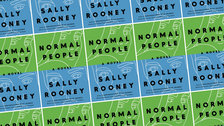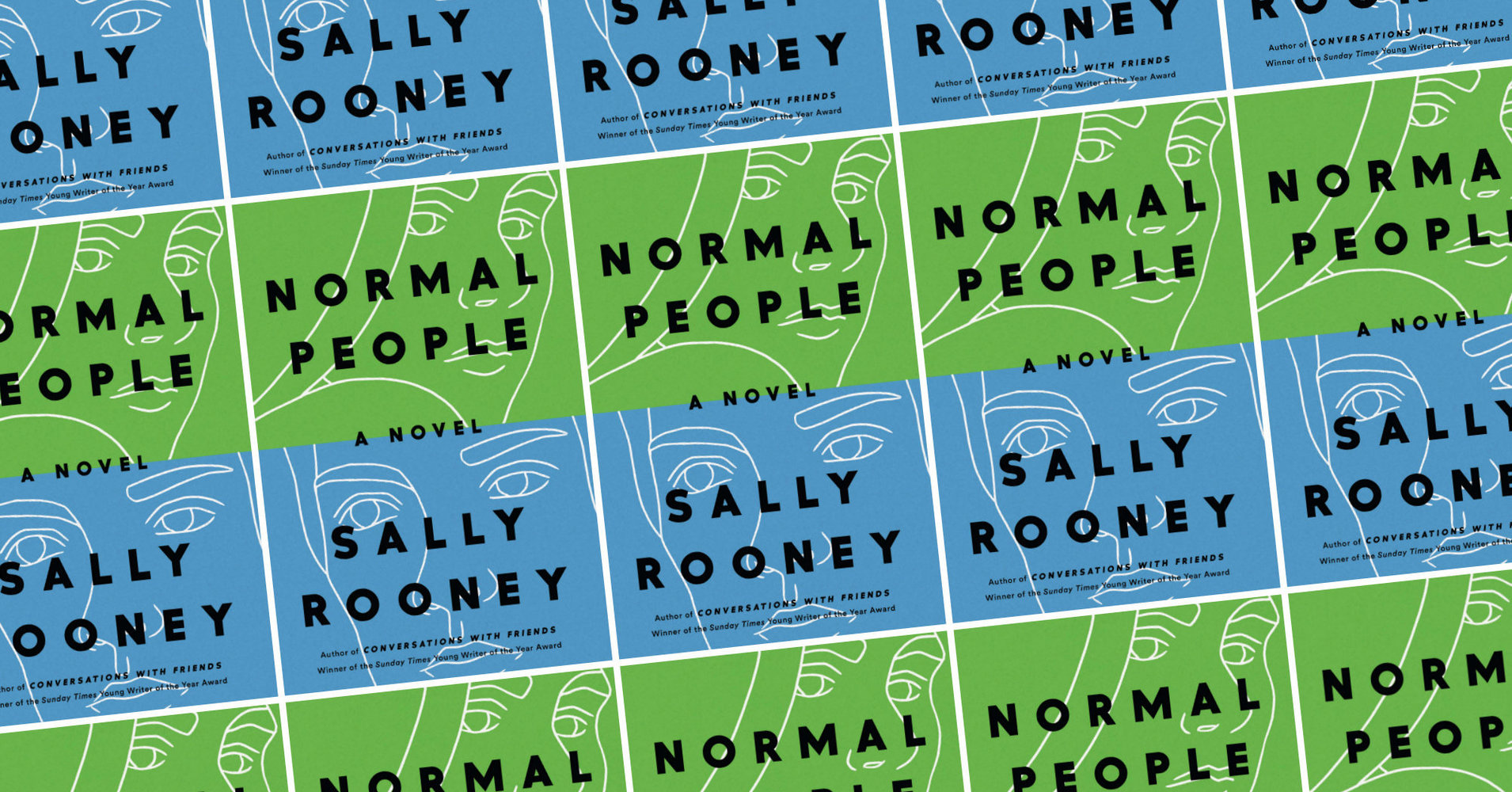[ad_1]

Marianne has a crush on the popular boy. Connell is a football star, lean and handsome, at their secondary school in western Ireland. She’s a loner, the smartest kid in class, with a bony beauty imperceptible to her cruel peers who taunt her for her flat chest. Connell, though, is different. He reads stacks of novels in secret. His mother cleans her family’s house, and whenever he comes by to pick his mother up, he talks to Marianne like he wants to impress her. She is enthralled. As she watches him on the pitch during a playoff match ― he scores the go-ahead goal ― “[i]t occurred to Marianne how much she wanted to see him having sex with someone; it didn’t have to be her, it could be anybody. It would be beautiful just to watch him.”
Sally Rooney’s Normal People, the Irish author’s hotly anticipated second novel, traces over the plot points and archetypes of a fairly standard story of first love: the lonely girl, the popular boy, the undeniable spark. And then comes the not-so-standard moment: a girl’s subversive voyeuristic craving. Rooney’s cool, bland prose is unassuming, her register a steady lulling wash, even as she slides the knife in.
Normal People, like her debut Conversations With Friends, examines the personal relationships among Irish students who struggle with human connection and opine about socialism at parties. At times, this can give the novel the feel of a standard love story garnished with trendy politics. But in Rooney’s work, the question of economics is ultimately woven into the fabric of relationships. The novel deftly outlines the teenage romance as an object of surveillance and the site of both metaphorical and literal exchanges of capital.
For Connell and Marianne, the dynamics keep shifting. When they meet, he has many friends and is being raised by a loving single mom, Lorraine, who has few financial resources; she, on the other hand, is at the bottom of the social food chain and is tormented at home by her loutish brother and cold mother, though the family is wealthy. He pursues a sexual dalliance with Marianne in large part because she promises no one will find out. Having it known that he gets naked with someone “[s]ome people thought … was the ugliest girl in school” would surely tarnish his godlike luster.
While money often intrudes upon Marianne and Connell’s relationship, it’s the brisk trade in social capital that makes the book hum. In the young adult world, among those still mastering the idea of having a private life and a public one, disclosure is currency and secrecy is new and precious. Before Marianne, Connell slept with girls who leveraged their close encounters into status by flaunting those flings. He longs to keep something to himself. Revealing their connection might boost Marianne’s standing, but he thinks it would reduce his, as if to balance the ledgers.
Marianne is initially willing to waive that fee, simply because she doesn’t much care what her schoolmates think of her. One night, she’s out with some of the popular girls from school selling raffle tickets for a dance when the others begin voicing concern about how late the boys are. Marianne texts Connell, who lets her know that they’re coming. “Nothing would feel more exhilarating to her at this moment than to say: They’ll be on their way shortly,” Marianne thinks. “How much terrifying and bewildering status would accrue to her in this one moment, how destabilising it would be, how destructive.” To be Connell’s girlfriend would be to catapult into a form of teenage celebrity, to be marked as desired at an age when kids are scrambling to understand what desire is, what qualities mark someone as desirable, and what the power of romantic love is.
And yet Marianne has her limits. The first phase of the romance ends when Connell tells her he’s asked the school’s queen bee, Rachel, to the graduation dance. Marianne, who had so frugally declined to spend his social capital, still hoped that he might willingly offer it to her; instead, she’s been humiliated.
When, months after their initial breakup, they stumble upon each other at university in Dublin, their social roles have been reversed: She has a group of posh friends and a debate-club boyfriend (“It’s classic me,” she jokes to Connell when they cross paths, “I came to college and got pretty”). Connell, cut off from his football mates back in Sligo and baffled by the cliques of well-heeled city kids, has no one. They slip back into an on-and-off romance, their breakups fueled by misunderstanding and their reunions by a sense of ineffable rightness.
‘It feels intellectually unserious to concern himself with fictional people marrying one another,’ Connell muses, halfway through reading Austen’s ‘Emma.’ ‘But there it is: literature moves him.’
Even as the power dynamics change, Connell and Marianne respond in idiosyncratic ways. They both have personal tendencies that complicate their relationship and that are suggestive of their economic positions: Marianne is internally directed and resourced, to the point that she craves the release of willing submission she feels with her high school love, while Connell is fatally dependent on the good opinion of others.
But for all this, Normal People is a true love story. Rooney remains tightly focused on the romance ― Marianne’s and Connell’s friendships are marginal and shallow, their ambitions mostly alluded to ― and the narrative is sprinkled with those heart-stuttering moments familiar from teen rom-coms. Connell standing up for Marianne in front of their school’s most popular girl, who has a crush on him. Marianne coolly brushing him off after he asks someone else to the graduation dance. Connell trying to impress her at university by destroying his rival at pool: “When it was just the black ball left he pointed at the top right-hand pocket and, gratifyingly, said: Alright, Marianne, are you watching?” The swoony sentimentality is seductive, but it also left me dissatisfied, even suspicious, as I often feel when a literary novel leans into comfortable tropes rather than destabilizing them.
Rooney, for her part, anticipates and lightly rebukes this critical impulse with an invocation of Jane Austen: “It feels intellectually unserious to concern himself with fictional people marrying one another,” Connell muses, halfway through reading Austen’s Emma. “But there it is: literature moves him.” Enjoyment of literature that isn’t about being moved, he thinks, is suspect. Connell studies with wealthy kids who confidently argue over texts without having even read them, more invested in their performance of erudition than in experiencing it. At a literary reading, he recognizes the whole proceeding as a flaunting of class signifiers and rather bleakly concludes that even being moved emotionally is a form of status consciousness, though this doesn’t quite quash his own literary ambitions.
Normal People is not, speaking of Austen, particularly funny, though the characters are always laughing. Laughing functions as a relational tool in the world of Normal People, as it often does in reality. People laugh to defuse tension or to play off a comment that’s wounded them. They make jokes that aren’t funny, simply to say what they’re really thinking without shattering their own egos. It’s a gentler dissection than Austen’s ― Rooney’s even, analytical prose leavened by the occasional droll sentence.
In other ways, Normal People does resemble Austen’s work: It’s a novel of reading and misreading, of the exterior clashing against the interior. It’s a novel about power, status and capital, and yet it allows its characters to be human and its trajectory to be optimistic. Circumstance is meaningful, but not determining. Rooney uses this romance to test how money and society shape intimate human connection, and how it can find ways around and through those bounds.
As the novel winds on, and the two stumble through their university years, Marianne’s and Connell’s self-destructive tendencies threaten to overwhelm them. It’s so easy to give up too much of themselves to other people ― Marianne to domineering boyfriends, Connell to everyone he wants to impress. What of themselves should they keep protected from others? What should they share?
Halfway through the novel, Marianne’s friend Peggy casually offers to have a threesome with them and Connell panics: He can’t imagine having sex with his girlfriend while another person watches. “For the privacy between himself and Marianne to be invaded by Peggy, or by another person, would destroy something inside him, a part of his selfhood, which doesn’t seem to have a name and which he has never tried to identify before,” Rooney writes. In Normal People, sex and love exert a powerful pull; people want to have them, to flaunt them, to spy on them, to trade information about them. And yet they promise something, Rooney’s characters suspect, that transcends mere utility. True intimacy is valuable, but not, perhaps, simply because it’s currency.
[ad_2]
Source link

